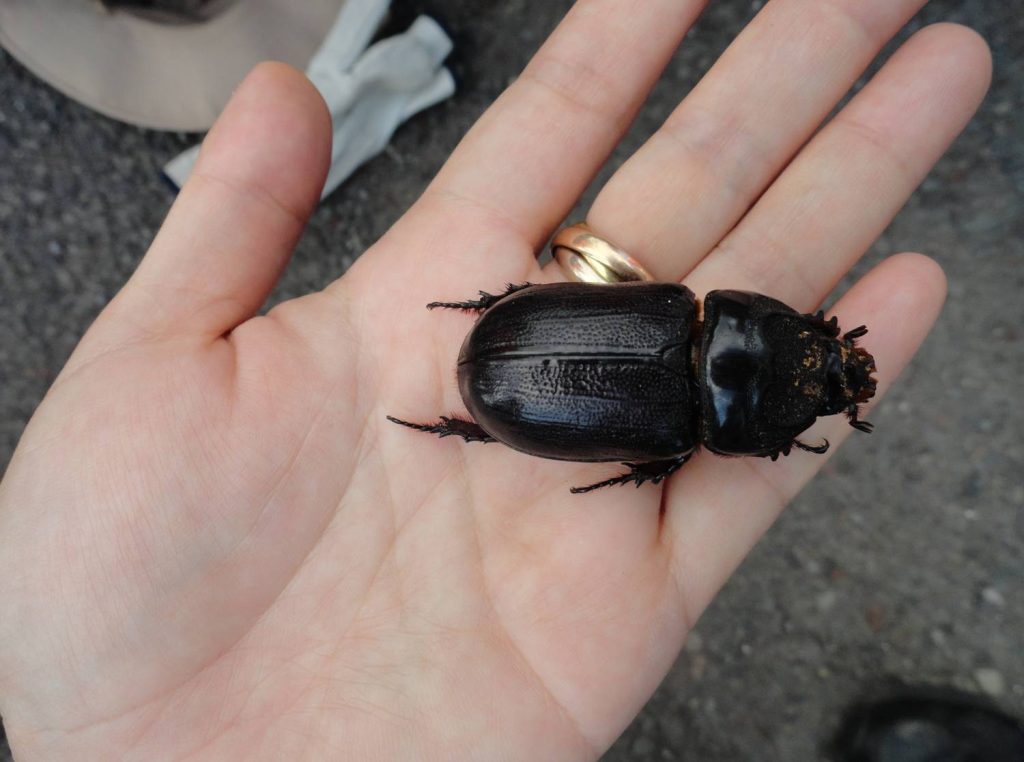HILO, Hawaiʻi – The County of Hawaiʻi, in coordination with the Hawaiʻi Department of Agriculture (HDOA), has issued a three-month voluntary compliance order for specific areas of West Hawaiʻi. Effective July 1 through September 30, 2025, this order aims to prevent the movement of host materials for the invasive coconut rhinoceros beetle (CRB), which poses a serious threat to the island’s agriculture.
The voluntary compliance area encompasses regions where CRB detections have occurred within the last six months. Its borders are defined by Waikoloa Road, Mamalahoa Highway (Highway 190) from Waikoloa Road to Palani Road in Kailua-Kona, and along the coastline from Palani Road to Waikoloa Road.
“The coconut rhinoceros beetle poses a serious threat to our island’s agriculture, and we are asking for your kōkua to stop the spread before it gets out of hand,” said Mayor Kimo Alameda. “Early intervention and cooperation are key to preventing long-term damage and protecting our island from this destructive invasive species.”
To effectively stop the spread of CRB, residents and business operators within this designated area are asked not to transport CRB host materials, which include:
- Decomposing plant material such as compost, wood or tree chips, and mulch.
- Plant propagation material.
- Other items, such as landscaping material, comprised of decomposing organic plant material.
- All live palm plants in the genera Cocos (Coconut palm), Livistona (Fountain palm or Chinese fan palm), Phoenix (Date palm, Canary Island date palm), Pritchardia (Loulu), Roystonea (Royal palm), and Washingtonia (California fan palm, Mexican fan palm) — with the exception of unsprouted seeds of these palms.
Host materials can harbor CRB eggs, larvae, and adults. Transporting infested materials outside the compliance area could inadvertently spread CRB far beyond its current range, complicating eradication efforts and hindering control measures. CRB primarily targets coconut and other palm species but can also feed on important crops like ʻulu, banana, and kalo if palm food sources are eliminated.
Residents and business operators within the compliance area who need to dispose of green waste are encouraged to take the material to designated sites:
- West Hawaiʻi Organics Facility at 71-1111 Queen Kaʻahumanu Highway
- Kealakehe Transfer Station at 74-598 Hale Makai Place
These facilities, located within the compliance area, heat compost piles to at least 131 degrees Fahrenheit, effectively killing CRB larvae. The voluntary compliance order is a precursor to a mandatory compliance structure currently being prepared by the HDOA.
“Controlling the movement of green waste to stop the spread of CRB is a call-to-action that all of us can do to protect Hawaiʻi Island,” said Sharon Hurd, Chairperson of the Hawaiʻi Board of Agriculture.
Best Management Practices for CRB Host Materials:
Residents can take the following steps to minimize the risk of spreading CRB:
Inspect and Report:
- Inspect CRB host materials (especially finished compost and nearby host palms) for signs of CRB or damage at least every 4 months.
- Examine incoming CRB host materials before accepting them to ensure they are not infested.
- Collect any suspected CRB and report findings or visible CRB damage to HDOA at 808-643-PEST (7378) or the Big Island Invasive Species Committee (BIISC) at 808-933-3340. Reports can also be made online at 643pest.org.
- If you cannot inspect materials yourself, contact BIISC, CRB Response (808-679-5244), or HDOA for assistance.
Properly Manage Materials:
- Chip incoming CRB host materials within 48 hours.
- Properly compost CRB host materials by heating piles to at least 131 degrees Fahrenheit.
- Monitor finished materials at least every 4 months (visual during turnover). Once compost cools to around 110 degrees Fahrenheit, it can become a breeding ground for CRB.
- Do not stockpile or keep a mound of CRB host material. Routinely distribute around plants or thinly spread up to 4 inches in depth to enable it to dry completely.
Prevent the Spread:
- Utilize or process CRB host materials that are already on-site for end use, eliminating the need to move potentially infested materials.
- Safeguard properly composted or treated CRB host materials in completely sealed containers made of metal, concrete, or glass, as CRB can chew through many plastics.
- Ensure CRB host materials are still at acceptable temperatures or are subjected to effective treatment before being transported off-site.
- Profume, a restricted-use pesticide, is an option for treating certain CRB host materials like compost. Contact HDOA for more information on its use.
- If you receive CRB host materials, ensure they come from a reputable source that follows CRB Best Management Practices and ask for documentation of their prevention efforts.
For questions about moving CRB host materials, please contact Glenn Sako, County Economic Development Specialist, at 808-961-8811.

